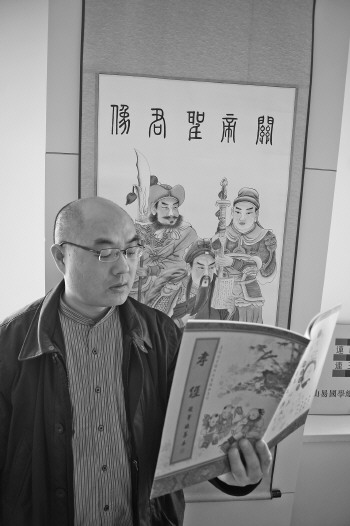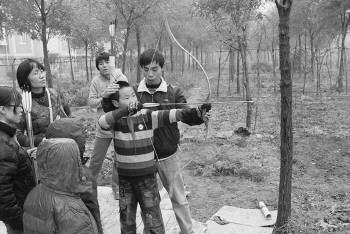source:
 , the head of a national study class shows the reading posture, should not be low, but should look at the book. Our newspaper reporter Zhang Rongbo photographed the
, the head of a national study class shows the reading posture, should not be low, but should look at the book. Our newspaper reporter Zhang Rongbo photographed the  Sinology class, and the children learned archery.
Sinology class, and the children learned archery. parents want uncontrolled children to learn more about etiquette, and private schools hope to develop a typical success by recitation and bring private schools into the public education system. 23, reporters interviewed learned that Ji'nan, Qingdao, Qufu and other places Sinology class quietly become popular, they mostly exist in the form of training institutions, and a few have established boarding schools.
experts say that the modern "private school" is a new education product. Although some "private schools" can not reach the teaching conditions, or even do not have a business license, after all, the traditional culture is the essence of traditional culture, and the relevant departments can also give more opportunities to private schools.
this reporter Zhang Rongbo Intern Fang Wenli teaching mode recitation, archery, massage into the national class course 23 noon, accompanied by the "hundred family names" reading sound, Ji'nan Yun de young Chinese School of Chinese School in charge of Song Yongsheng a section of "four books five" Chanting, audio and video courses are sent to the Internet for children to study online. Hanging on the wall, Guan Yu read the book, trying to tell the students that the ancients read books and do not bow.
"classical Chinese reading in the past was sung, not read out." Song Yongsheng said seriously.
after the ancient classics such as "disciple rules", "100 family names" and other ancient classics in 2001, the children of two years old were taught to be "the prodigies" of more than 5000 Chinese characters. With the love of traditional culture, Song Yongsheng started a private school. "At the beginning, there were only a dozen or so children. We taught them to read classics, archery, Chinese medicine and gardening." Song Yongsheng said.
in the province's Sinology circle, like Song Yongsheng, many people founded Sinology classes and private schools. At present, there are more than ten famous schools in Ji'nan. Most of these private schools are based on the thirteen classics taught by children in the past. The teaching mode is basically small class, receiving children aged 3 to 13 years old. Some national school classes also recruit boarding students. Mr. Fu, the head of the classical school in Qingdao, said that he referred to the four books as "the foundation", reading the classics as "frame", the talent is "decoration", and then formed a whole set of teaching ideas.
although the tuition fee is between 10 thousand and 20 thousand yuan per year, private schools are still favored by many parents. Tao Ming, the director of the education center of the private school of the Pu Ming private school in Ji'nan, said that now they have set up 9 private school classes in Ji'nan, and there are more than 130 children in the school. "We teach children etiquette, Chinese medicine and tea ceremony, so that they can read" disciple rules "and" filial piety "and teach them how to behave. In addition to Ji'nan, Qufu, Qingdao, Weifang, Linyi, Dezhou and other places have opened national school classes and private schools, although the scale and teaching content are not the same, but it is introduced that the popularity of these national classes is not small in the local, and each has its own characteristics.
"the Manjusri recitation school in Ji'nan" was founded by two retired teachers, mainly calligraphy. In the Dezhou plain, if the Lanlou school pays more attention to Buddhism, we mainly rely on traditional Chinese medicine. Song Yongsheng said that taking archery as an example, it is mainly for children to practice and study quietly. Learning Chinese medicine is to enable children to learn to think in an integrated way. Some of the unlicensed residents are running classes. Some private schools have no business licenses. They are only family members. This kind of existence space makes Song Yongsheng feel awkward in the face of parents' questions about their children's way out. His own children have also entered the small, early and high educational system.
this confusion has not become clear with the welcome of parents of Chinese Studies and private schools. A private school teacher confessed that the private school has no regular teachers, neither in accordance with the law of compulsory education, nor in modern education, so many private schools are living in gray areas, still a private school, and are popularized in a small circle.
professor Cheng Qili, a professor at the Qilu Institute of cultural research at the Shandong Normal University, said that in his side, many parents let their children re read national studies and value the impact of national studies on their children's health and moral education, but private schools are difficult to integrate with the current system, especially the college entrance examination. "Learning from traditional culture should take into account the development of society and adapt to the progress of society, and can not be closed to running schools." Chu Zhaohui, a researcher at the Chinese Academy of educational science, told reporters that the emergence of Chinese School and private schools at the present stage embodies modern openness and also embodies the needs of parents for the diversity of educational products. "We can not simply say that private school education is not legal. In the course of accreditation and college entrance examination, the education department can give an opportunity to transform Chinese education. Parents wish to let the naughty children learn more, Song Yongsheng said, although many cities in the province have private schools, but in fact, the circle is not big, and the founding process is quite similar.
in 1998, Song Yongsheng studied Chinese classics and began to study classics such as Yi learning. A few years later, Song Yongsheng's child was born, and he began to "do the experiment" on the child. As a result, the child recited "Lao Tzu" at the age of two. "This touched me. I sent the child to a foreign national study class for a year, some pain, and finally came back." Song Yongsheng believes that it is meaningful for children to learn Chinese classics earlier, or even to learn and recite classics of Chinese classics. "Gu Hongming, a modern historian, like Fu Sinian, who learned Chinese and Western cultures, has benefited from reciting classics and gained a good memory." Song Yongsheng said that these recent achievements have convinced him that Chinese learning can help children develop intelligence.
Tao Ming was born in a traditional Chinese medicine family. After she was born, she also wanted to give the best things to her children. "The best is wisdom, and the greatest wisdom is China's excellent traditional culture." In 2010, she wrote his ideal of education in her blog: "education should cultivate children to be educated, filial piety, respecting teachers, understanding and culculate... We are unpredictable, but we should give him the best things in the most crucial stage of his life. Song Yongsheng believes that the knowledge which is the most difficult to gnawing at the national school lets the children learn through special memory when they do not choose, this is a "Olympic champion" training model. "For example, Deng Ya Ping and Liu Guoliang are the elite of sports. They only develop one specialty from an early age." In Song Yongsheng's Sinology class, there are some children who are expelled from school and children who can not adapt to school education. "Parents want their children to know a little bit of manners and upbringing here." In this regard, Sun Ju, deputy director of the provincial CPPCC and vice director of the Committee of the Committee of literature and history, said that a case of a 10 year old girl beating a one and a half year old boy last year showed the importance of traditional education, which is the most needed in today's society.